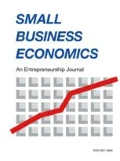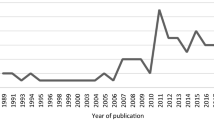Abstract
Although it is reported that early venture decisions are influenced by the relationships and common history of entrepreneurial team members, little is known about how the mutual interests and ambitions experienced in the pre-start-up phase provide a shared and relational context for joint decisions. Drawing on a multiple case study approach of nine entrepreneurial teams in new ventures, this study identifies the shared pre-start-up moments of transition during which team members’ prior work and life patterns start to change. We show that in these intense moments, shared entrepreneurial cognition evolves among team members—the relationality of which provides a unique social context for decision behaviors. Our findings conclude that effectual behaviors advance a theory of context because in simultaneously working with effectual and causal logics (albeit with varying intensities), team decisions are realized that are consistent with the relational context that emerges in the pre-start-up moment.


Similar content being viewed by others
Notes
As team decisions might be the result of multiple causes, other potential effects from meaningful factors were explored that were not the focus of our study, such as team founding experience and uncertainty (Sarasvathy 2001; Reymen et al. 2015), as well as firm industry, size, and age (e.g., Souitaris and Maestro 2009). No distinct patterns emerged considering these factors.
As to be expected, cofounders also expressed individual views that were not shared by all team members. However, in most of these cases, we found equivalent views of other cofounders that were not identical in their content but similar in their direction, allowing an aggregation on the more abstract level of our themes. In the rare case that we were unable to find an equivalent for a selected view, we verified that it did not affect our findings and decided to neglect it in all cases.
As not all shared cognitions fell neatly into one category, we coded according to the predominant characteristics within each case.
References
Alsos, G. A., Clausen, T. H., & Solvoll, S. (2014). Towards a better measurement scale of causation and effectuation. Academy of Management Proceedings, 2014(1). https://doi.org/10.5465/AMBPP.2014.13785abstract.
Alsos, G. A., Clausen, T. H., Hytti, U., & Solvoll, S. (2016). Entrepreneurs’ social identity and the preference of causal and effectual behaviours in start-up processes. Entrepreneurship and Regional Development, 28(3–4), 234–258.
Andries, P., Debackere, K., & van Looy, B. (2013). Simultaneous experimentation as a learning strategy: business model development under uncertainty. Strategic Entrepreneurship Journal, 7(4), 288–310.
Arend, R. J., Sarooghi, H., & Burkemper, A. (2015). Effectuation as ineffectual? Applying the 3E theory-assessment framework to a proposed new theory of entrepreneurship. Academy of Management Review, 40(4), 630–651.
Bamberger, P. (2008). From the editors beyond contextualization: using context theories to narrow the micro-macro gap in management research. Academy of Management Journal, 51(5), 839–846.
Baron, J. N., Hannan, M. T., & Burton, M. D. (1999). Building the iron cage: determinants of managerial intensity in the early years of organizations. American Sociological Review, 64(4), 527–547.
Beckman, C. M. (2006). The influence of founding team company affiliations on firm behavior. Academy of Management Journal, 49(4), 741–758.
Bell, S. T., Villado, A. J., Lukasik, M. A., Belau, L., & Briggs, A. L. (2011). Getting specific about demographic diversity variable and team performance relationships: a meta-analysis. Journal of Management, 37(3), 709–743.
Bradbury, H., & Lichtenstein, B. M. B. (2000). Relationality in organizational research: exploring the space between. Organization Science, 11(5), 551–564.
Brannon, D. L., Wiklund, J., & Haynie, J. M. (2013). The varying effects of family relationships in entrepreneurial teams. Entrepreneurship Theory and Practice, 37(1), 107–132.
Breugst, N., Patzelt, H., & Rathgeber, P. (2015). How should we divide the pie? Equity distribution and its impact on entrepreneurial teams. Journal of Business Venturing, 30(1), 66–94.
Brinckmann, J., Grichnik, D., & Kapsa, D. (2010). Should entrepreneurs plan or just storm the castle? A meta-analysis on contextual factors impacting the business planning–performance relationship in small firms. Journal of Business Venturing, 25(1), 24–40.
Cannon-Bowers, J. A., & Salas, E. (2001). Reflections on shared cognition. Journal of Organizational Behavior, 22(2), 195–202.
Chwolka, A., & Raith, M. G. (2012). The value of business planning before start-up — a decision-theoretical perspective. Journal of Business Venturing, 27(3), 385–399.
Creswell, J. W. (2012). Educational research: planning, conducting, and evaluating quantitative and qualitative research (4th ed.). Boston, MA: Pearson.
Dai, Y., Roundy, P. T., Chok, J. I., Ding, F., & Byun, G. (2016). “Who knows what?” in new venture teams: transactive memory systems as a micro-foundation of entrepreneurial orientation. Journal of Management Studies, 53(8), 1320–1347.
DeTienne, D. R., McKelvie, A., & Chandler, G. N. (2015). Making sense of entrepreneurial exit strategies: a typology and test. Journal of Business Venturing, 30(2), 255–272.
Dew, N., Read, S., Sarasvathy, S. D., & Wiltbank, R. (2009). Effectual versus predictive logics in entrepreneurial decision-making: differences between experts and novices. Journal of Business Venturing, 24(4), 287–309.
Discua Cruz, A., Howorth, C., & Hamilton, E. (2013). Intrafamily entrepreneurship: the formation and membership of family entrepreneurial teams. Entrepreneurship Theory and Practice, 37(1), 17–46.
Dubois, A., & Gadde, L.-E. (2002). Systematic combining: an abductive approach to case research. Journal of Business Research, 55(7), 553–560.
Eisenhardt, K. M. (1989). Building theories from case study research. Academy of Management Review, 14(4), 532–550.
Eisenhardt, K. M. (2013). Top management teams and the performance of entrepreneurial firms. Small Business Economics, 40(4), 805–816.
Eisenhardt, K. M., & Schoonhoven, C. B. (1996). Resource-based view of strategic alliance formation: strategic and social effects in entrepreneurial firms. Organization Science, 7(2), 136–150.
Emirbayer, M., & Mische, A. (1998). What is agency? American Journal of Sociology, 103(4), 962–1023.
Engel, Y., Dimitrova, N. G., Khapova, S. N., & Elfring, T. (2014). Uncertain but able: entrepreneurial self-efficacy and novices’ use of expert decision-logic under uncertainty. Journal of Business Venturing Insights, 1–2, 12–17.
Ensley, M. D., & Pearce, C. L. (2001). Shared cognition in top management teams: implications for new venture performance. Journal of Organizational Behavior, 22(2), 145–160.
Fauchart, E., & Gruber, M. (2011). Darwinians, communitarians, and missionaries: the role of founder identity in entrepreneurship. Academy of Management Journal, 54(5), 935–957.
Fletcher, D. E. (2011). A curiosity for contexts: entrepreneurship, enactive research and autoethnography. Entrepreneurship and Regional Development, 23(1–2), 65–76.
Fletcher, D. E., & Selden, P. (2016). A relational conceptualization of context and real time emergence of entrepreneurship processes. In F. Welter & W. B. Gartner (Eds.), A research agenda for entrepreneurship and context (pp. 79–92). Glos, Cheltenham: Edward Elgar.
Furr, N. R., Cavarretta, F., & Garg, S. (2012). Who changes course? The role of domain knowledge and novel framing in making technology changes. Strategic Entrepreneurship Journal, 6(3), 236–256.
Gabrielsson, J., & Politis, D. (2011). Career motives and entrepreneurial decision-making: examining preferences for causal and effectual logics in the early stage of new ventures. Small Business Economics, 36(3), 281–298.
van Gelderen, M., Verduyn, K., & Masurel, E. (2012). Introduction to ‘entrepreneurship in context’. In Entrepreneurship in context (pp. 12–33). London, UK: Routledge.
Gerring, J. (2007). Case study research: principles and practices. New York, NY: Cambridge University Press.
Grégoire, D. A., Corbett, A. C., & McMullen, J. S. (2011). The cognitive perspective in entrepreneurship: an agenda for future research. Journal of Management Studies, 48(6), 1443–1477.
Grimes, M. (2017). The pivot: how founders respond to feedback through idea and identity work. Academy of Management Journal. https://doi.org/10.5465/amj.2015.0823.
Hambrick, D. C., Cho, T. S., & Chen, M.-J. (1996). The influence of top management team heterogeneity on firms’ competitive moves. Administrative Science Quarterly, 41(4), 659–684.
Jin, L., Madison, K., Kraiczy, N. D., Kellermanns, F. W., Crook, T. R., & Xi, J. (2017). Entrepreneurial team composition characteristics and new venture performance: a meta-analysis. Entrepreneurship Theory and Practice, 41(5), 743–771.
Kamm, J. B., & Nurick, A. J. (1993). The stages of team venture formation: a decision-making model. Entrepreneurship: Theory and Practice, 17(2), 17–28.
Kamm, J. B., Shuman, J. C., Seeger, J. A., & Nurick, A. J. (1990). Entrepreneurial teams in new venture creation: a research agenda. Entrepreneurship Theory and Practice, 14(4), 7–17.
Knockaert, M., Ucbasaran, D., Wright, M., & Clarysse, B. (2011). The relationship between knowledge transfer, top management team composition, and performance: the case of science-based entrepreneurial firms. Entrepreneurship Theory and Practice, 35(4), 777–803.
Lechler, T. (2001). Social interaction: a determinant of entrepreneurial team venture success. Small Business Economics, 16(4), 263–278.
Mathias, B. D., Williams, D. W., & Smith, A. R. (2015). Entrepreneurial inception: the role of imprinting in entrepreneurial action. Journal of Business Venturing, 30(1), 11–28.
Miles, M. B., & Huberman, A. M. (1984). Drawing valid meaning from qualitative data: toward a shared craft. Educational Researcher, 13(5), 20–30.
de Mol, E., Khapova, S. N., & Elfring, T. (2015). Entrepreneurial team cognition: a review. International Journal of Management Reviews, 17(2), 232–255.
Read, S., Sarasvathy, S. D., Dew, N., & Wiltbank, R. (2016). Response to Arend, Sarooghi, and Burkemper (2015): cocreating effectual entrepreneurship research. Academy of Management Review, 41(3), 528–536.
Reymen, I. M. M. J., Andries, P., Berends, H., Mauer, R., Stephan, U., & van Burg, E. (2015). Understanding dynamics of strategic decision making in venture creation: a process study of effectuation and causation. Strategic Entrepreneurship Journal, 9(4), 351–379.
Sarasvathy, S. D. (2001). Causation and effectuation: toward a theoretical shift from economic inevitability to entrepreneurial contingency. Academy of Management Review, 26(2), 243–263.
Sarasvathy, S. D. (2008). Effectuation: elements of entrepreneurial expertise. Cheltenham, UK: Edward Elgar.
Sarasvathy, S. D., & Dew, N. (2005). New market creation through transformation. Journal of Evolutionary Economics, 15(5), 533–565.
Sarasvathy, S. D., Dew, N., Read, S., & Wiltbank, R. (2008). Designing organizations that design environments: lessons from entrepreneurial expertise. Organization Studies, 29(3), 331–350.
Sarasvathy, S. D., Kumar, K., York, J. G., & Bhagavatula, S. (2014). An effectual approach to international entrepreneurship: overlaps, challenges, and provocative possibilities. Entrepreneurship Theory and Practice, 38(1), 71–93.
Smolka, K. M., Verheul, I., Burmeister-Lamp, K., & Heugens, P. (2016). Get it together! Synergistic effects of causal and effectual decision-making logics on venture performance. Entrepreneurship Theory and Practice, 42(4), 571–604.
Souitaris, V., & Maestro, B. M. M. (2009). Polychronicity in top management teams: the impact on strategic decision processes and performance of new technology ventures. Strategic Management Journal, 31(6), 652–678.
Spinosa, C., Flores, F., & Dreyfus, H. L. (1997). Disclosing new worlds: entrepreneurship, democratic action, and the cultivation of solidarity. Cambridge, MA: MIT Press.
Strauss, A. L., & Corbin, J. M. (1998). Basics of qualitative research: techniques and procedures for developing grounded theory (2nd ed.). Thousand Oaks, CA: Sage.
Welter, F. (2011). Contextualizing entrepreneurship—conceptual challenges and ways forward. Entrepreneurship Theory and Practice, 35(1), 165–184.
Welter, F., & Gartner, W. B. (2016). A research agenda for entrepreneurship and context. Cheltenham, UK: Edward Elgar.
West, G. P. (2007). Collective cognition: when entrepreneurial teams, not individuals, make decisions. Entrepreneurship Theory and Practice, 31(1), 77–102.
Zahra, S. A., & Wright, M. (2011). Entrepreneurship’s next act. The Academy of Management Perspectives, 25(4), 67–83.
Acknowledgments
We thank Katrin Hussinger and Petra Andries and two anonymous reviewers for helpful comments on previous versions and Rocky Adiguna for co-coding.
Funding
This research is funded by the Luxembourg National Research Fund (FNR).
Author information
Authors and Affiliations
Corresponding author
Additional information
Publisher’s note
Springer Nature remains neutral with regard to jurisdictional claims in published maps and institutional affiliations.
Appendix
Appendix
Rights and permissions
About this article
Cite this article
Tryba, A., Fletcher, D. How shared pre-start-up moments of transition and cognitions contextualize effectual and causal decisions in entrepreneurial teams. Small Bus Econ 54, 665–688 (2020). https://doi.org/10.1007/s11187-019-00148-7
Accepted:
Published:
Issue Date:
DOI: https://doi.org/10.1007/s11187-019-00148-7




